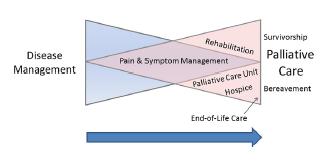The UBC Division of Palliative Care follows the WHO definition of Palliative Care. Palliative care is committed to the relief of suffering, maximizing a person’s comfort, independence and quality of life when his or her illness is no longer amenable to cure. To honour this commitment of care, palliative care aims to provide “whole person care”, i.e. physical, psychological, cultural, social, existential and spiritual support to the dying and to the bereaved.
Note that early integration of palliative care into disease management has been shown to be more effective than when initiated late in the course of illness, and that early integration means that some patients who have palliative care needs may still have disease-management options with potential for cure or long-term survival. Modern palliative care therefore includes components of rehabilitation and transition to survivorship.
Definition of Palliative Care:
Palliative care is an approach that improves the quality of life of patients and their families facing the problem associated with life-threatening illness, through the prevention and relief of suffering by means of early identification and impeccable assessment and treatment of pain and other problems, physical, psychosocial and spiritual. Palliative care:
- provides relief from pain and other distressing symptoms;
- affirms life and regards dying as a normal process;
- intends neither to hasten or postpone death;
- integrates the psychological and spiritual aspects of patient care;
- offers a support system to help patients live as actively as possible until death;
- offers a support system to help the family cope during the patients illness and in their own bereavement;
- uses a team approach to address the needs of patients and their families, including bereavement counselling, if indicated;
- will enhance quality of life, and may also positively influence the course of illness;
- is applicable early in the course of illness, in conjunction with other therapies that are intended to prolong life, such as chemotherapy or radiation therapy, and includes those investigations needed to better understand and manage distressing clinical complications.
WHO Definition of Palliative Care for Children
Palliative care for children represents a special, albeit closely related field to adult palliative care. WHO’s definition of palliative care appropriate for children and their families is as follows; the principles apply to other paediatric chronic disorders (WHO; 1998a):
- Palliative care for children is the active total care of the child’s body, mind and spirit, and also involves giving support to the family.
- It begins when illness is diagnosed, and continues regardless of whether or not a child receives treatment directed at the disease.
- Health providers must evaluate and alleviate a child’s physical, psychological, and social distress.
- Effective palliative care requires a broad multidisciplinary approach that includes the family and makes use of available community resources; it can be successfully implemented even if resources are limited.
- It can be provided in tertiary care facilities, in community health centres and even in children’s homes.
The WHO Definition in a Visual Model
Bow Tie Model of 21st Century Palliative Care (P.Hawley 2014)
